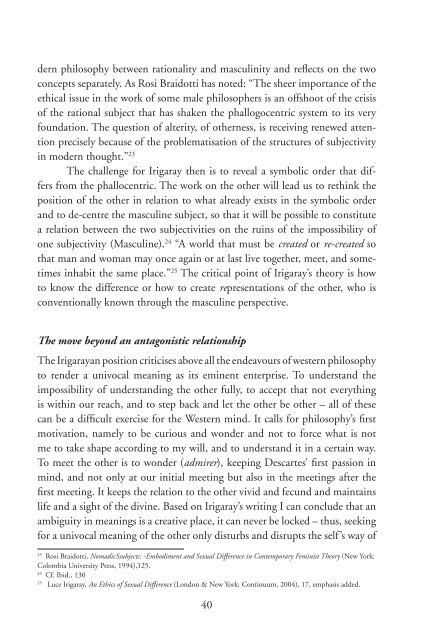Teaching Subjectivity. Travelling Selves for Feminist ... - MailChimp
Teaching Subjectivity. Travelling Selves for Feminist ... - MailChimp
Teaching Subjectivity. Travelling Selves for Feminist ... - MailChimp
Create successful ePaper yourself
Turn your PDF publications into a flip-book with our unique Google optimized e-Paper software.
dern philosophy between rationality and masculinity and reflects on the two<br />
concepts separately. As Rosi Braidotti has noted: “The sheer importance of the<br />
ethical issue in the work of some male philosophers is an offshoot of the crisis<br />
of the rational subject that has shaken the phallogocentric system to its very<br />
foundation. The question of alterity, of otherness, is receiving renewed attention<br />
precisely because of the problematisation of the structures of subjectivity<br />
in modern thought.” 23<br />
The challenge <strong>for</strong> Irigaray then is to reveal a symbolic order that differs<br />
from the phallocentric. The work on the other will lead us to rethink the<br />
position of the other in relation to what already exists in the symbolic order<br />
and to de-centre the masculine subject, so that it will be possible to constitute<br />
a relation between the two subjectivities on the ruins of the impossibility of<br />
one subjectivity (Masculine). 24 “A world that must be created or re-created so<br />
that man and woman may once again or at last live together, meet, and sometimes<br />
inhabit the same place.” 25 The critical point of Irigaray’s theory is how<br />
to know the difference or how to create representations of the other, who is<br />
conventionally known through the masculine perspective.<br />
The move beyond an antagonistic relationship<br />
The Irigarayan position criticises above all the endeavours of western philosophy<br />
to render a univocal meaning as its eminent enterprise. To understand the<br />
impossibility of understanding the other fully, to accept that not everything<br />
is within our reach, and to step back and let the other be other – all of these<br />
can be a difficult exercise <strong>for</strong> the Western mind. It calls <strong>for</strong> philosophy’s first<br />
motivation, namely to be curious and wonder and not to <strong>for</strong>ce what is not<br />
me to take shape according to my will, and to understand it in a certain way.<br />
To meet the other is to wonder (admirer), keeping Descartes’ first passion in<br />
mind, and not only at our initial meeting but also in the meetings after the<br />
first meeting. It keeps the relation to the other vivid and fecund and maintains<br />
life and a sight of the divine. Based on Irigaray’s writing I can conclude that an<br />
ambiguity in meanings is a creative place, it can never be locked – thus, seeking<br />
<strong>for</strong> a univocal meaning of the other only disturbs and disrupts the self’s way of<br />
23<br />
Rosi Braidotti, NomadicSsubjects: -Embodiment and Sexual Difference in Contemporary <strong>Feminist</strong> Theory (New York:<br />
Colombia University Press, 1994),125.<br />
24<br />
Cf. Ibid., 130<br />
25<br />
Luce Irigaray, An Ethics of Sexual Difference (London & New York: Continuum, 2004), 17, emphasis added.<br />
40

















